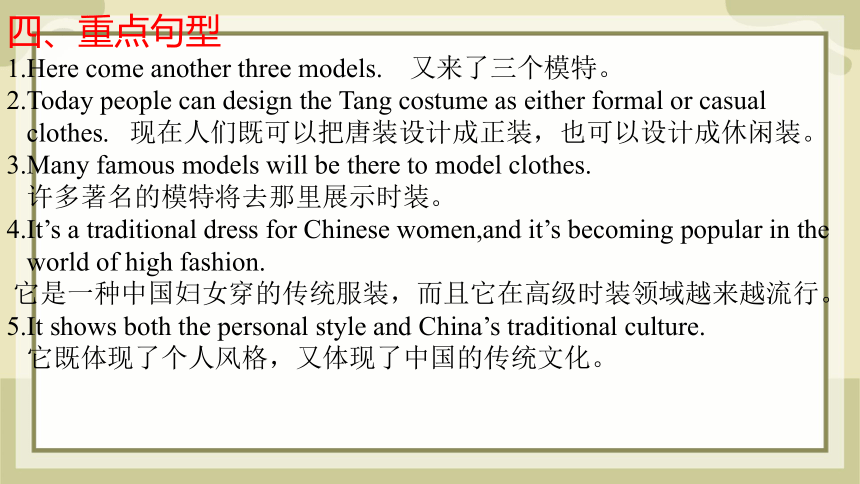八年级下册英语课件 Unit 8 Our Clothes Topic 3 复习 课件(24张PPT)
文档属性
| 名称 | 八年级下册英语课件 Unit 8 Our Clothes Topic 3 复习 课件(24张PPT) |

|
|
| 格式 | pptx | ||
| 文件大小 | 94.8KB | ||
| 资源类型 | 教案 | ||
| 版本资源 | 仁爱科普版 | ||
| 科目 | 英语 | ||
| 更新时间 | 2025-04-27 10:28:45 | ||
图片预览









文档简介
(共24张PPT)
Unit 8 Topic 3
预习&复习
二、短语归纳
1.there will be another fashion show. 将有另一场服装秀
2.model the clothes 展示服装
3.read the poster 看海报
4.Here comes the models. 模特来了
5.in the center of the catwalk 在表演台中央
6.a common dress 常见的连衣裙
7.a traditional dress for Chinese women 中国女性的传统连衣裙
8.become popular 变得流行
9.in the world of high fashion 时尚世界中
10.another three models 另外三个模特
11.be in minority costumes 穿着少数民族服装
12.be not sure about sth. 对某事不确定
13.know a lot about fashion 对时尚了解很多
14.know as much as Jane 和Jane了解得一样多
15.what kind of costume 什么样的服装
16.with pleasure 乐意
17.some other models 一些其他的模特
18.watch a fashion show 看一场服装秀
19.How do you like the show 你认为这场秀怎么样?
20.take photos with you 和你一起拍照
21.be full of culture 充满了文化
22.stand for Chinese history 代表中国历史
23.get one's name 得名
24.become known to sb. 被某人所熟知
25.during the Tang dynasty 在唐朝
26.from then on 从那时起
27.in other Asian countries 在其他亚洲国家
28.silk knots 丝结
29.the other decorations on Tang-style clothes 在唐装风格衣服上的其他装饰
30.design…as… 设计成
31.either …or… 要么……要么
32.personal style 个人风格
33.China's traditional culture 中国传统文化
34.western-style suits 西式套装
35.the well-known item 著名的商品
36.the most popular choice of clothing for young people
年轻人最流行的服饰选择
37.at one time 曾经
38.few people 极少人
39.except on special occasions 除了特殊的场合
40.national celebrations 全国庆典
41.in the center of... 在……中央
42.a traditional dress 传统服装
43.in the world of... 在……领域
44.high fashion 高级时装
45.another+名词单数=one more +名词单数
another apple= one more apple
46.another+数词+名词复数=数词+more+名词复数
another two years=two more years
47.minority costume 少数民族服装
48.be(not) sure of/about... 对……(没)有把握
be sure to do sth. 一定做某事
be sure that+从句 一定……
make sure 弄清楚,确信
49.be full of... 充满……
50.stand for 代表,象征
be the/a symbol of... 是……的象征
51.become/be known to... 为……所熟知
52.from then on 从那时起
53.either...or... 要么……要么……,或者……或者(谓语动词就近原则)
54.not only...but (also)... 不但……而且……(谓语动词就近原则)
55.both...and... 两者都……(谓语动词复数)
56.design...as... 把……设计成……
57.at one time=once 曾经,一度
58.as a result 结果
三、词性转换
1.model n.模特,模型,模范;v.当模特,模拟,塑造
2.tradition n.传统
traditional adj.传统的,惯例的
3.attract v.吸引
attractive adj.吸引人的,迷人的
attraction n.吸引,吸引力,吸引人的事物
4.choose v.选择
choice n.【可数】选择
5.celebrate v.庆祝
celebration n.【可数】庆祝,庆祝会
6.decorate v.装饰
decoration n.【可数】装饰,装修
7.person n.人,身体,容貌
personal adj.个人的,私人的
8.express v.表达,表示,表露
expression n.【可数】表达,表示,表现
9.marry v.结婚
married adj.已婚的,婚姻的
marriage n.【可数】结婚,婚姻
四、重点句型
1.Here come another three models. 又来了三个模特。
2.Today people can design the Tang costume as either formal or casual
clothes. 现在人们既可以把唐装设计成正装,也可以设计成休闲装。
3.Many famous models will be there to model clothes.
许多著名的模特将去那里展示时装。
4.It’s a traditional dress for Chinese women,and it’s becoming popular in the
world of high fashion.
它是一种中国妇女穿的传统服装,而且它在高级时装领域越来越流行。
5.It shows both the personal style and China’s traditional culture.
它既体现了个人风格,又体现了中国的传统文化。
五、重点句型、句式、知识点
1.There is going to be a fashion show in fashion show in Xidan Shopping
center. 在西单购物中心将会有一场时装秀。
There is going to be…是There be结构的将来时,表示某地将举行某项运
动,或将有某物。
如:There is going to be a football match in our school next week.
=There will be a football match in our school next week.
我们学校下周将有一场足球比赛。
there is/are going to be=there will be
2.Here come the models. 模特走过来了。
(1)英语中以here或there开头的句子要倒装,除主语是代词外,动词要放
在主语之前。
如:Here come Mary! 玛丽来了!
Here come the bus! 车来了!
(2)主语若是人称代词时,主语和谓语的语序不变。
如:Here she comes. 她来了。
Here it is.它在这儿。
3.The Tang costume stands for Chinese history and fashion culture.
唐装代表着中国的历史和服装文化。
stand for意为“代表”,
如:It stands for Olympics. 它代表着奥林匹克。
4.The so-called Tang costume got its name because China became known to
other countries during the Han and Tang Dynasties.
所谓的唐装是因为中国在汉、唐时期开始文明于世而得名。
(1)so-called所谓的 (2)get one's name得名.
如:The village got its name from the lake in it.
这个村庄因村内的湖泊而得名。
5.Chinese fashion is different from not only western fashion,but also fashion
from other Asian countries such as Japan and Korea.
中国时装不仅不同于西方国家,也有别于其他亚洲国家,如日本和韩国等.
(1) be different from 与……不同
(2)not only …but also 意为“不但……而且”
(3)such as 例如,比如说
6.Today the Tang costume can be designed as formal or casual clothes.
现在唐装被设计成有正式款的,也有休闲款的。
be designed as 被设计成
如:They decided that the theater will be designed as a palace.
他们决定把那个剧院设计成宫殿模样。
7.Today,few people wear kimonos except for special occasions like weddings
and national celebrations.
except for除……之外
如:The roads were clear except for a few cars.
除了几辆小汽车外,马路上空荡荡的。
8.There be 句型一般将来时结构:There will be.../There is going to be...
Section A
1. And he said the fashion show was wonderful.
并且他说时装表演很精彩。
此句结构:主句为he said,宾语从句为the fashion show was wonderful, 中 间省略了引导词 that。在这个句子中,我们重点注意宾语从句的时态
必须与主句呼应。
(1) 当主句中谓语动词是一般现在时或一般将来时,从句中的谓语动词不
受主句谓语时态的影响,可以按需要使用任何时态。
如:她说她要在他的桌子上留个便条。
She says (that) she will leave a message on his desk.
(2) 若主句是过去时,从句的谓语动词的时态要变成相应的过去时态,即
一般现在时变为一般过去时;一般将来时变为过去将来时;现在进行
时变为过去进行时等。
如:①吉姆说他喜欢听音乐。
Jim said (that) he liked listening to music.
②玛丽告诉我她正在努力学习汉语。
Maria told me (that) she was working hard on her Chinese.
③他问他们什么时候去参观农场。
He asked when they would visit the farm.
2. There will be another one there tomorrow.
明天那儿将举行另一场时装表演。
There will be...=There is/are going to be...是there be句型的一般将来时结构
Section B
1. The model in the center of the catwalk looks so beautiful.
T形台中央的模特儿看起来真美。
in the center of the catwalk 是介词短语作定语,修饰the model。
介词短语作定语时,一律后置。
如: 重庆的火锅很有名。The hot pot in Chongqing is very famous.
2. It's a traditional dress for Chinese women, and it's becoming popular in the world of high fashion.
它是中国妇女穿的一种传统服装,而且它在高级时装领域内正逐渐流行起来。
(1) a traditional dress 传统服装 traditional 传统的
(2) in the world of... 在......领域
如:在足球界 in the world of football3.
3.Here come another three models 又过来三个模特
another 作形容词时,意为“又一个,再一个”
其结构为 another + 单数可数名词=one more+单数可数名词
another +数词+复数可数名词=数词+more+复数可数名词
如: Please drink another cup ( = one more cup) of tea. 请再喝一杯茶。 Where shall we be in another ten years ( = ten more years)
再过十年,我们将在哪里?
Section C
1. It got its name when China became known to other countries during the Han and Tang dynasties. From then on, people called Chinese clothes,"Tang costumes". 唐装是因为中国在汉唐时期闻名于世而得名。从那时起,人
们叫这种服装为“唐装”。
(1) get its name 得名
如:The village got its name from the lake in it.
这个村庄因村内的湖泊而得名。
(2) become known to 变得为......所熟知,意思相当于be famous to
如:Beijing is/becomes known (famous) to all the people in the world because of the 2008 Olympics.北京因2008年奥运会为全世界的人所熟知。
(3) from then on 从那时起
2. Today people can design the Tang costume as either formal or casual clothes. 现在人们既可以把唐装设计成正装,也可以设计成休闲装。
(1) design …as… 把......设计成....
如: 设计师把这块布设计成一条漂亮的裙子。
The designer designed this piece of cloth as a beautiful dress.
(2) either… or… 或者......或者......,要么......要么......,通常连接同等成分。 连接主语时,其谓语动词的形式服从“就近原则”,即取决于最靠近动
词的那个名词或代词的单复数形式。
如:Either he or I am going. 要么他去,要么我去。
Either Kangkang or Michael is right. 要么康康对,要么迈克尔对。
Section D
1. At one time, Japanese people wore kimonos for casual and formal occasions. 曾经,日本人在非正式和正式场合都穿和服。
at one time 曾经,一度,相当于once。
如: At one time, he was a teacher. 他曾经是一位老师。
2. Today, few people wear kimonos except on special occasions like
marriages and national celebrations.
如今,几乎没有人穿和服,除非在像婚礼或国家庆典这样的特殊场合。
except 除......之外(指从整体中除去一个或一部分,除去的人或物不在整
体内。)
如:Everyone was tired except John. 除约翰之外,大家都累了
六、语法——宾语从句(Ⅳ)
一、宾语从句中的时态
主句中的谓语动词是一般现在时,宾语从句中的时态不受影响。主句中的谓语动词是一般过去时,宾语从句则使用相应的过去时态。
e.g. I think that I can sell newspapers.
我想我可以卖报纸。
I heard you had abad cold.
我听说你得了重感冒。
【注意】1.如果宾语从句所表达的内容是客观真理和客观事实,从句中
动词的时态不受主句中谓语动词时态的限制。
e.g. The teacher said that the earth moves round the sun.
老师说地球绕着太阳转。
2.当动词所表示的状态或动作在引述时仍在继续,从句中动词的时态不受主句中谓语动词时态的限制。
e.g. She also saidmany famous models are going there to model the clothes.
她还说很多名模将会去那里进行时装表演。
She said that the show starts at 10:30 tomorrow morning.
她说时装秀明早十点半开始。
He said he is forty. 他说他四十岁了。
二、学习宾语从句还应注意以下几点
1.当宾语从句跟在动词think, believe, suppose,expect等表示“想,相信,
认为”等的动词后边时,如果从句是否定含义,则不用否定形式,而将
主句谓语动词think等变为否定形式,即“否定前移”。
e.g. I don’t think you are right. 我想你是不对的。
I don’t believe hecan finish the work on time.
我认为他不能按时完成工作。
2.在think, believe, imagine, suppose, guess, hope 等动词以及I’m afraid 等
后,可用so代替一个肯定的宾语从句,用not代替一个否定的宾语从句。
e.g. —Do you believe he will come 你相信他会来吗?
—I believe so. 我相信会。
—I don’t believe so.
(或I believe not.) 我相信不会。
3.许多带复合宾语的句子中,that引导的宾语从句经常移到句子后面,而
且用it作形式宾语。
e.g. We think it is wrong that he told a lie to everyone.
我们认为他对每一个人都说谎是错误的。
We thought it a pity that she missed the chance.
我们认为她错过这个机会是一个遗憾。
七、习题
(一)单项选择。
( )1. Jim said the book ____ very interesting.
A. be B. is C. was D. are
( )2. None of the shoes in the shop fit me well. They are __ too big __too small.
A. both; and B. either; or C. not only; but also D. not; but
( )3. There ____ a stamp collection show in the museum this afternoon.
A. is B. is going to have C. has D. is going to be
( )4. The policeman asked the child ____ so that he could take him home.
A. where did he live B. where he lived
C. how did he live D. how he lived
( )5. Not only Mr. Wang but also his students usually ____ school on foot.
A. reaches B. get to C. arrives D. arrive
( )6. The Great Wall is known ____ the world.
A. for B. as C. on D. to
C
B
D
B
B
D
( )7. Cheongsam is one of ____ dresses in China. And many foreigners also
like it very much.
A. traditional B. a most traditional
C. more traditional D. the most traditional
( )8. All my classmates are Tibetans ____ me.
A. except B. besides C. with D. on
( )9. China is an ____ country.
A. European B. Asian C. American D. African
( )10. —Harbin is really a beautiful city and there’re many places of interest.
—So it is. Why not stay here for ____ two days
A. other B. others C. another D. more
(二)、填空
(A)根据汉语或首字母提示填空。
41. The Spring Festival is one of the most t_________ festivals in China.
42. Now more and more people own p_________ computers.
D
A
B
C
traditional
personal
43. You’d better l______ what you want to buy before you go to the supermarket.
44. China, Korea and Japan are all A________ countries.
45. There are millions of starts a _________ us in the sky.
(B)用所给词的适当形式填空。
46. Today, few people wear kimonos except on special occasions like marriage
and national_________ (celebrate).
47. The Tang costume is _________ (know) to many other countries now.
48. The Tang costume is very _________ (attract) and very different from
western-style suits.
49. Think it over before making an important _________ (choose).
50. _________ (marry) is an event(大事) during everyone’s life.
Ⅱ. 句型转换。
51. Li Lei said, “I come from Shanghai.” (改为含有宾语从句的复合句)
Li Lei said that ________ ________ from Shanghai.
list
Asian
above
celebration
known
attractive
choice
Marriage
he came
52. Do you know When does the train leave (改为含有宾语从句的复合句)
Do you know _____ ____ ____ ___
53. One of the two boys must stay here. (改为同义句)
____ ____ the boys must stay here.
54. Both Lily and Lucy like dancing. (改为同义句)
____ ____ Lily ____ ____ Lucy ____ dancing.
55. English names are not the same as Chinese names. (改为同义句)
English names are _______ _______ Chinese names.
Goodbye!
when the train leaves
Either of
Not only
but also
likes
different from
Unit 8 Topic 3
预习&复习
二、短语归纳
1.there will be another fashion show. 将有另一场服装秀
2.model the clothes 展示服装
3.read the poster 看海报
4.Here comes the models. 模特来了
5.in the center of the catwalk 在表演台中央
6.a common dress 常见的连衣裙
7.a traditional dress for Chinese women 中国女性的传统连衣裙
8.become popular 变得流行
9.in the world of high fashion 时尚世界中
10.another three models 另外三个模特
11.be in minority costumes 穿着少数民族服装
12.be not sure about sth. 对某事不确定
13.know a lot about fashion 对时尚了解很多
14.know as much as Jane 和Jane了解得一样多
15.what kind of costume 什么样的服装
16.with pleasure 乐意
17.some other models 一些其他的模特
18.watch a fashion show 看一场服装秀
19.How do you like the show 你认为这场秀怎么样?
20.take photos with you 和你一起拍照
21.be full of culture 充满了文化
22.stand for Chinese history 代表中国历史
23.get one's name 得名
24.become known to sb. 被某人所熟知
25.during the Tang dynasty 在唐朝
26.from then on 从那时起
27.in other Asian countries 在其他亚洲国家
28.silk knots 丝结
29.the other decorations on Tang-style clothes 在唐装风格衣服上的其他装饰
30.design…as… 设计成
31.either …or… 要么……要么
32.personal style 个人风格
33.China's traditional culture 中国传统文化
34.western-style suits 西式套装
35.the well-known item 著名的商品
36.the most popular choice of clothing for young people
年轻人最流行的服饰选择
37.at one time 曾经
38.few people 极少人
39.except on special occasions 除了特殊的场合
40.national celebrations 全国庆典
41.in the center of... 在……中央
42.a traditional dress 传统服装
43.in the world of... 在……领域
44.high fashion 高级时装
45.another+名词单数=one more +名词单数
another apple= one more apple
46.another+数词+名词复数=数词+more+名词复数
another two years=two more years
47.minority costume 少数民族服装
48.be(not) sure of/about... 对……(没)有把握
be sure to do sth. 一定做某事
be sure that+从句 一定……
make sure 弄清楚,确信
49.be full of... 充满……
50.stand for 代表,象征
be the/a symbol of... 是……的象征
51.become/be known to... 为……所熟知
52.from then on 从那时起
53.either...or... 要么……要么……,或者……或者(谓语动词就近原则)
54.not only...but (also)... 不但……而且……(谓语动词就近原则)
55.both...and... 两者都……(谓语动词复数)
56.design...as... 把……设计成……
57.at one time=once 曾经,一度
58.as a result 结果
三、词性转换
1.model n.模特,模型,模范;v.当模特,模拟,塑造
2.tradition n.传统
traditional adj.传统的,惯例的
3.attract v.吸引
attractive adj.吸引人的,迷人的
attraction n.吸引,吸引力,吸引人的事物
4.choose v.选择
choice n.【可数】选择
5.celebrate v.庆祝
celebration n.【可数】庆祝,庆祝会
6.decorate v.装饰
decoration n.【可数】装饰,装修
7.person n.人,身体,容貌
personal adj.个人的,私人的
8.express v.表达,表示,表露
expression n.【可数】表达,表示,表现
9.marry v.结婚
married adj.已婚的,婚姻的
marriage n.【可数】结婚,婚姻
四、重点句型
1.Here come another three models. 又来了三个模特。
2.Today people can design the Tang costume as either formal or casual
clothes. 现在人们既可以把唐装设计成正装,也可以设计成休闲装。
3.Many famous models will be there to model clothes.
许多著名的模特将去那里展示时装。
4.It’s a traditional dress for Chinese women,and it’s becoming popular in the
world of high fashion.
它是一种中国妇女穿的传统服装,而且它在高级时装领域越来越流行。
5.It shows both the personal style and China’s traditional culture.
它既体现了个人风格,又体现了中国的传统文化。
五、重点句型、句式、知识点
1.There is going to be a fashion show in fashion show in Xidan Shopping
center. 在西单购物中心将会有一场时装秀。
There is going to be…是There be结构的将来时,表示某地将举行某项运
动,或将有某物。
如:There is going to be a football match in our school next week.
=There will be a football match in our school next week.
我们学校下周将有一场足球比赛。
there is/are going to be=there will be
2.Here come the models. 模特走过来了。
(1)英语中以here或there开头的句子要倒装,除主语是代词外,动词要放
在主语之前。
如:Here come Mary! 玛丽来了!
Here come the bus! 车来了!
(2)主语若是人称代词时,主语和谓语的语序不变。
如:Here she comes. 她来了。
Here it is.它在这儿。
3.The Tang costume stands for Chinese history and fashion culture.
唐装代表着中国的历史和服装文化。
stand for意为“代表”,
如:It stands for Olympics. 它代表着奥林匹克。
4.The so-called Tang costume got its name because China became known to
other countries during the Han and Tang Dynasties.
所谓的唐装是因为中国在汉、唐时期开始文明于世而得名。
(1)so-called所谓的 (2)get one's name得名.
如:The village got its name from the lake in it.
这个村庄因村内的湖泊而得名。
5.Chinese fashion is different from not only western fashion,but also fashion
from other Asian countries such as Japan and Korea.
中国时装不仅不同于西方国家,也有别于其他亚洲国家,如日本和韩国等.
(1) be different from 与……不同
(2)not only …but also 意为“不但……而且”
(3)such as 例如,比如说
6.Today the Tang costume can be designed as formal or casual clothes.
现在唐装被设计成有正式款的,也有休闲款的。
be designed as 被设计成
如:They decided that the theater will be designed as a palace.
他们决定把那个剧院设计成宫殿模样。
7.Today,few people wear kimonos except for special occasions like weddings
and national celebrations.
except for除……之外
如:The roads were clear except for a few cars.
除了几辆小汽车外,马路上空荡荡的。
8.There be 句型一般将来时结构:There will be.../There is going to be...
Section A
1. And he said the fashion show was wonderful.
并且他说时装表演很精彩。
此句结构:主句为he said,宾语从句为the fashion show was wonderful, 中 间省略了引导词 that。在这个句子中,我们重点注意宾语从句的时态
必须与主句呼应。
(1) 当主句中谓语动词是一般现在时或一般将来时,从句中的谓语动词不
受主句谓语时态的影响,可以按需要使用任何时态。
如:她说她要在他的桌子上留个便条。
She says (that) she will leave a message on his desk.
(2) 若主句是过去时,从句的谓语动词的时态要变成相应的过去时态,即
一般现在时变为一般过去时;一般将来时变为过去将来时;现在进行
时变为过去进行时等。
如:①吉姆说他喜欢听音乐。
Jim said (that) he liked listening to music.
②玛丽告诉我她正在努力学习汉语。
Maria told me (that) she was working hard on her Chinese.
③他问他们什么时候去参观农场。
He asked when they would visit the farm.
2. There will be another one there tomorrow.
明天那儿将举行另一场时装表演。
There will be...=There is/are going to be...是there be句型的一般将来时结构
Section B
1. The model in the center of the catwalk looks so beautiful.
T形台中央的模特儿看起来真美。
in the center of the catwalk 是介词短语作定语,修饰the model。
介词短语作定语时,一律后置。
如: 重庆的火锅很有名。The hot pot in Chongqing is very famous.
2. It's a traditional dress for Chinese women, and it's becoming popular in the world of high fashion.
它是中国妇女穿的一种传统服装,而且它在高级时装领域内正逐渐流行起来。
(1) a traditional dress 传统服装 traditional 传统的
(2) in the world of... 在......领域
如:在足球界 in the world of football3.
3.Here come another three models 又过来三个模特
another 作形容词时,意为“又一个,再一个”
其结构为 another + 单数可数名词=one more+单数可数名词
another +数词+复数可数名词=数词+more+复数可数名词
如: Please drink another cup ( = one more cup) of tea. 请再喝一杯茶。 Where shall we be in another ten years ( = ten more years)
再过十年,我们将在哪里?
Section C
1. It got its name when China became known to other countries during the Han and Tang dynasties. From then on, people called Chinese clothes,"Tang costumes". 唐装是因为中国在汉唐时期闻名于世而得名。从那时起,人
们叫这种服装为“唐装”。
(1) get its name 得名
如:The village got its name from the lake in it.
这个村庄因村内的湖泊而得名。
(2) become known to 变得为......所熟知,意思相当于be famous to
如:Beijing is/becomes known (famous) to all the people in the world because of the 2008 Olympics.北京因2008年奥运会为全世界的人所熟知。
(3) from then on 从那时起
2. Today people can design the Tang costume as either formal or casual clothes. 现在人们既可以把唐装设计成正装,也可以设计成休闲装。
(1) design …as… 把......设计成....
如: 设计师把这块布设计成一条漂亮的裙子。
The designer designed this piece of cloth as a beautiful dress.
(2) either… or… 或者......或者......,要么......要么......,通常连接同等成分。 连接主语时,其谓语动词的形式服从“就近原则”,即取决于最靠近动
词的那个名词或代词的单复数形式。
如:Either he or I am going. 要么他去,要么我去。
Either Kangkang or Michael is right. 要么康康对,要么迈克尔对。
Section D
1. At one time, Japanese people wore kimonos for casual and formal occasions. 曾经,日本人在非正式和正式场合都穿和服。
at one time 曾经,一度,相当于once。
如: At one time, he was a teacher. 他曾经是一位老师。
2. Today, few people wear kimonos except on special occasions like
marriages and national celebrations.
如今,几乎没有人穿和服,除非在像婚礼或国家庆典这样的特殊场合。
except 除......之外(指从整体中除去一个或一部分,除去的人或物不在整
体内。)
如:Everyone was tired except John. 除约翰之外,大家都累了
六、语法——宾语从句(Ⅳ)
一、宾语从句中的时态
主句中的谓语动词是一般现在时,宾语从句中的时态不受影响。主句中的谓语动词是一般过去时,宾语从句则使用相应的过去时态。
e.g. I think that I can sell newspapers.
我想我可以卖报纸。
I heard you had abad cold.
我听说你得了重感冒。
【注意】1.如果宾语从句所表达的内容是客观真理和客观事实,从句中
动词的时态不受主句中谓语动词时态的限制。
e.g. The teacher said that the earth moves round the sun.
老师说地球绕着太阳转。
2.当动词所表示的状态或动作在引述时仍在继续,从句中动词的时态不受主句中谓语动词时态的限制。
e.g. She also saidmany famous models are going there to model the clothes.
她还说很多名模将会去那里进行时装表演。
She said that the show starts at 10:30 tomorrow morning.
她说时装秀明早十点半开始。
He said he is forty. 他说他四十岁了。
二、学习宾语从句还应注意以下几点
1.当宾语从句跟在动词think, believe, suppose,expect等表示“想,相信,
认为”等的动词后边时,如果从句是否定含义,则不用否定形式,而将
主句谓语动词think等变为否定形式,即“否定前移”。
e.g. I don’t think you are right. 我想你是不对的。
I don’t believe hecan finish the work on time.
我认为他不能按时完成工作。
2.在think, believe, imagine, suppose, guess, hope 等动词以及I’m afraid 等
后,可用so代替一个肯定的宾语从句,用not代替一个否定的宾语从句。
e.g. —Do you believe he will come 你相信他会来吗?
—I believe so. 我相信会。
—I don’t believe so.
(或I believe not.) 我相信不会。
3.许多带复合宾语的句子中,that引导的宾语从句经常移到句子后面,而
且用it作形式宾语。
e.g. We think it is wrong that he told a lie to everyone.
我们认为他对每一个人都说谎是错误的。
We thought it a pity that she missed the chance.
我们认为她错过这个机会是一个遗憾。
七、习题
(一)单项选择。
( )1. Jim said the book ____ very interesting.
A. be B. is C. was D. are
( )2. None of the shoes in the shop fit me well. They are __ too big __too small.
A. both; and B. either; or C. not only; but also D. not; but
( )3. There ____ a stamp collection show in the museum this afternoon.
A. is B. is going to have C. has D. is going to be
( )4. The policeman asked the child ____ so that he could take him home.
A. where did he live B. where he lived
C. how did he live D. how he lived
( )5. Not only Mr. Wang but also his students usually ____ school on foot.
A. reaches B. get to C. arrives D. arrive
( )6. The Great Wall is known ____ the world.
A. for B. as C. on D. to
C
B
D
B
B
D
( )7. Cheongsam is one of ____ dresses in China. And many foreigners also
like it very much.
A. traditional B. a most traditional
C. more traditional D. the most traditional
( )8. All my classmates are Tibetans ____ me.
A. except B. besides C. with D. on
( )9. China is an ____ country.
A. European B. Asian C. American D. African
( )10. —Harbin is really a beautiful city and there’re many places of interest.
—So it is. Why not stay here for ____ two days
A. other B. others C. another D. more
(二)、填空
(A)根据汉语或首字母提示填空。
41. The Spring Festival is one of the most t_________ festivals in China.
42. Now more and more people own p_________ computers.
D
A
B
C
traditional
personal
43. You’d better l______ what you want to buy before you go to the supermarket.
44. China, Korea and Japan are all A________ countries.
45. There are millions of starts a _________ us in the sky.
(B)用所给词的适当形式填空。
46. Today, few people wear kimonos except on special occasions like marriage
and national_________ (celebrate).
47. The Tang costume is _________ (know) to many other countries now.
48. The Tang costume is very _________ (attract) and very different from
western-style suits.
49. Think it over before making an important _________ (choose).
50. _________ (marry) is an event(大事) during everyone’s life.
Ⅱ. 句型转换。
51. Li Lei said, “I come from Shanghai.” (改为含有宾语从句的复合句)
Li Lei said that ________ ________ from Shanghai.
list
Asian
above
celebration
known
attractive
choice
Marriage
he came
52. Do you know When does the train leave (改为含有宾语从句的复合句)
Do you know _____ ____ ____ ___
53. One of the two boys must stay here. (改为同义句)
____ ____ the boys must stay here.
54. Both Lily and Lucy like dancing. (改为同义句)
____ ____ Lily ____ ____ Lucy ____ dancing.
55. English names are not the same as Chinese names. (改为同义句)
English names are _______ _______ Chinese names.
Goodbye!
when the train leaves
Either of
Not only
but also
likes
different from
同课章节目录
- Unit 5 Feeling excited
- Topic 1 You look excited
- Topic 2 I’m feeling better now.
- Topic 3 Many things can affect our feelings.
- Unit 6 Enjoying Cycling
- Topic 1 We're going on a three-day visit to Mount
- Topic 2 How about exploring Tian’anmen Square?
- Topic 3 Bicycle riding is good exercise.
- Unit 7 Food festival
- Topic 1 We’re preparing for a food festival.
- Topic 2 I’m not sure whether I can cook it well.
- Topic 3 I Cooked the Most Successfully
- Unit 8 Our Clothes
- Topic 1 We will have a class fashion show.
- Topic 2 We can design our own uniforms.
- Topic 3 He said the fashion show was wonderful.
